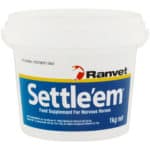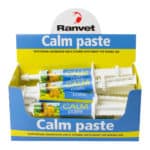Magnesium for horses: The role it plays in performance horses and horse health
Magnesium plays an important role in nerve and muscle function. Deficient horses can show signs of nervousness, muscle weakness, poor tolerance to work and can predispose ‘tying up’ in performance horses. Magnesium has also been reported as an important part of reducing equine obesity and can lower the risk of laminitis in horses prone to it during periods of fast growing spring grass.
Understanding the major functions of magnesium for horses can help shed some light on why adequate magnesium in your horse’s diet is so important. At a cellular level calcium and magnesium work hand in hand. Calcium is involved in contracting the muscle; when a muscle cell is triggered by movement by a nerve, the cell membrane opens and calcium rushes in. The increase in calcium concentration causes a reaction and in turn the muscle cell contracts. Once the contraction has occurred, magnesium in the cell helps drive out the calcium, relaxing the muscle. This occurs in every muscle cell, for every movement, at a very rapid rate (Stewart, 2011). Unfortunately, when magnesium is inadequately provided in the horse’s diet, calcium can leak back into the cell and the muscle remains stimulated and does not completely relax.
About sixty percent of magnesium is stored in the skeleton and thirty-two percent in the muscle tissue (Stewart, 2011). When there is a deficiency of magnesium for horses, the stored magnesium in bones and muscle is used to maintain the balance of calcium. Over time this causes a negative feedback response in the brain and triggers the release of adrenaline, further reason for the behaviour demonstrated in deficient horses.
Horses deficient in magnesium display one or some of the following behaviours:
- Unable to relax
- Angry about being brushed, touched or palpated on either side of the spine
- History of tying up
- Does not tolerate long periods of work and becomes more excited rather than working down
- Fractious, nervous and random spooking
- Muscle tremors and twitches
- Teeth grinding
- Irregular heartbeat or pounding heart
The recommended daily intake of magnesium for horses recommended by the National Research Council (2012) is 20mg per kilogram of bodyweight per day. For a 500kg horse in light to moderate work, a requirement of 10g per day is needed to counteract losses due to sweat. Magnesium toxicity is very rare as excess magnesium is excreted in the urine. However, to ensure overdosing does not occur, Ranvet Nutritionists can review your horses diet to ensure the correct amount of magnesium is provided to balance the workload.
Ranvet’s Settle ‘em® contains highly concentrated Vitamin B1 and magnesium, known for their beneficial calming effects and ability to calm nervous and flighty behaviour, can also rectify nervous related diarrhoea. Ranvet’s Calm Paste® is our popular one dose paste which aids nerve and muscle function while maintaining appetite in horses. Calm Paste® contains Tryptophan, which is produced as a natural sedative within the brain, in addition to magnesium and Vitamin B1 which help to reduce aggression and fearfulness.


Written by Eliza Barton BAnVetBSc
Source: Stewart, A.J., 2011. Magnesium disorders in horses. Vet Clin North Am Equine Pract 27, 149-163.
Experts in Equine Nutrition
Every product in the Ranvet range has been developed to meet a horse’s most specific need at any given time, be it in a training environment or on a breeding farm. Having pioneered the formulation of specific medications and dietary supplements for horses, the company is now recognised as a leader in the areas of equine health and nutrition.
